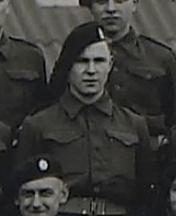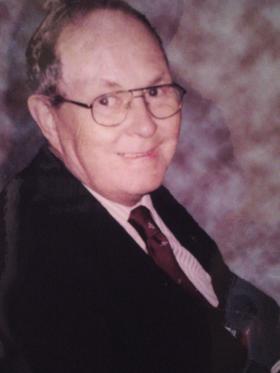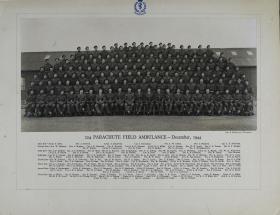Private John Francis FitzGerald, known as 'Frank', was my father.
Frank was born on 30 January 1925, the third child and eldest son of Frank and May FitzGerald. After leaving school at 14, he went on to join the Army with the Royal Army Medical Corps in 1943, aged 18 years old.
Shortly afterwards, he volunteered for special duties, no doubt encouraged by the extra pay, but was very proud to be selected for Airborne Forces. After completing Parachute Course 137 at RAF Ringway in October 1944. He was posted as a Medic with 2 Section, 224 Parachute Field Ambulance RAMC and is pictured with the unit in December 1944.
In March 1945, No 2 Section were attached to 8th (Midlands) Parachute Battalion to take part in Rhine Crossing, on Operation Varsity. Frank was dropped into Wesel in the Black Forest region of Germany, over the Rhine. The Battalion was immediately attacked by enemy troops and suffered massive loss of life and serious injuries, Frank himself receiving terrible machine gun bullet wounds to both legs. Having been left unattended for some time, he was finally rescued from the battlefield, one of the last men to have been evacuated.
On his eventual return to Britain where he was a patient at many hospitals ending up in Alder Hey. At Alder Hey he met a nurse, May Ledwidge, who he had known as a neighbour since he was 14, and they began their courtship. After his recovery, he was medically discharged from the Army in 1947. His military conduct was described as 'exemplary' and his Commanding Officer’s testimonial stated:-
'He has carried out his military duties in an entirely satisfactory manner. Thoroughly honest and sober and a man in whom reliance can be placed'.
May and Frank were married on 24 July 1948 at St Teresa’s, Norris Green, beginning their life together in Liverpool. They later had six children, Annette, John, Clare, Pat, Damian and Angela.
Frank made a career as a skilled engineer to support his family, in spite of frequent hospital stays for painful operations and treatments for the disabling injuries he sustained during the war. Whilst living an Kirby, Frank became heavily involved in the church community and later worked for many voluntary causes such as Age Concern, the Society of St Vincent de Paul, and he was also a prison visitor. In 1996 he was awarded the Benemerenti or Papal Medal in recognition of his exceptional service to the Catholic Church and wider community.
Frank and May offered a cherished sense of stability, love and security for the family; eating together, attending mass together, playing, learning and working together. These strong family values shaped the lives of the FitzGerald children. Their needs changed over the years, but their need of Frank never diminished. In fact, it grew as he became a father-in-law, granddad and treasured friend. Frank was a great fixer – he’d have a go at anything: mechanical, electrical, animal, vegetable or mineral – regardless of size!
Finally however, his disabilities forced him to retire early, though Frank was busier than ever, devoting more time to his community interests and his expanding family. In 1997 he was diagnosed with Cerebellar Ataxia, an uncommon progressive neurological condition that caused periods of extreme illness and gradually reduced his physical capabilities. In addition to this devastating illness, he also developed cancer.
My father suffered without complaint, stoically accepting each deterioration and never losing his spirit, and spoke very little about his wartime experiences. He cherished each and every moment shared with May, his family and his many friends.
He died in 2005 at the age of 80. Frank was an inspiration in all ways to his family. His family are very proud of him and miss him more than words can say.




Latest Comments
There are currently no comments for this content.
Add Comment
In order to add comments you must be registered with ParaData.
If you are currently a ParaData member please login.
If you are not currently a ParaData member but wish to get involved please register.